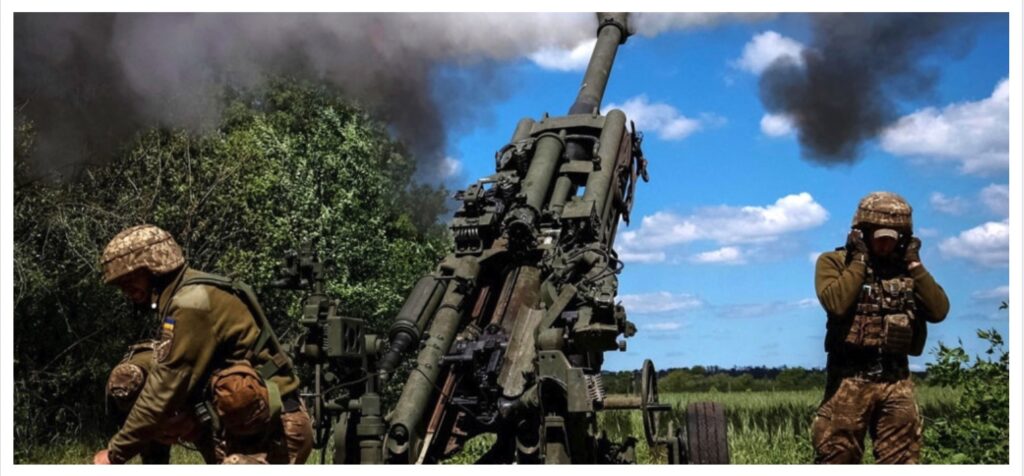James Risen and Ken Klippenstein
High-tech surveillance may have blinded the U.S. to how corruption has weakened the Russian military.
[Editor’s note: Ukraine, the US, the UK and NATO, have been planning for a Russian incursion since 2014, when the “color revolution” financed with $5b US taxpayer dollars was used to drive out the Russian-friendly president and install a Western stooge, of which Zelensky is only the latest (and most monstrous) iteration. Those included Javelin anti-tank missiles and Stinger anti-aircraft missiles, of the kind Osama bin Laden assisted in arming the mujahideen, which they used to shoot down Soviet helicopters and planes. These are serious weapons, which have made the operation far more difficult than Putin had originally anticipated. But, in my opinion, there is no serious doubt about which side shall prevail. It’s just taking a bit longer than planned.]
Ever since Ukraine launched a successful counteroffensive against Russian forces in late August, American officials have tried to claim credit, insisting that U.S. intelligence has been key to Ukraine’s battlefield victories.
Yet U.S. officials have simultaneously downplayed their intelligence failures in Ukraine — especially their glaring mistakes at the outset of the war. When Putin invaded in February, U.S. intelligence officials told the White House that Russia would win in a matter of days by quickly overwhelming the Ukrainian army, according to current and former U.S. intelligence officials, who asked not to be named to discuss sensitive information.
The Central Intelligence Agency was so pessimistic about Ukraine’s chances that officials told President Joe Biden and other policymakers that the best they could expect was that the remnants of Ukraine’s defeated forces would mount an insurgency, a guerrilla war against the Russian occupiers. By the time of the February invasion, the CIA was already planning how to provide covert support for a Ukrainian insurgency following a Russian military victory, the officials said.
U.S. intelligence reports at the time predicted that Kyiv would fall quickly, perhaps in a week or two at the most. The predictions spurred the Biden administration to secretly withdraw some key U.S. intelligence assets from Ukraine, including covert former special operations personnel on contract with the CIA, the current and former officials said. Their account was backed up by a Naval officer and a former Navy SEAL, who were aware of the movements and who also asked not to be named because they were not authorized to speak publicly.
The CIA “got it completely wrong,” said one former senior U.S. intelligence official, who is knowledgeable about what the CIA was reporting when the Russian invasion began. “They thought Russia would win right away.”
When it became clear that the agency’s predictions of a rapid Russian victory had been wrong, the Biden administration sent the clandestine assets that had been pulled out of Ukraine back into the country, the military and intelligence officials said. One U.S. official insisted that the CIA only conducted a partial withdrawal of its assets when the war began, and that the agency “never completely left.”
Yet clandestine American operations inside Ukraine are now far more extensive than they were early in the war, when U.S. intelligence officials were fearful that Russia would steamroll over the Ukrainian army. There is a much larger presence of both CIA and U.S. special operations personnel and resources in Ukraine than there were at the time of the Russian invasion in February, several current and former intelligence officials told The Intercept.
Secret U.S. operations inside Ukraine are being conducted under a presidential covert action finding, current and former officials said. The finding indicates that the president has quietly notified certain congressional leaders about the administration’s decision to conduct a broad program of clandestine operations inside the country. One former special forces officer said that Biden amended a preexisting finding, originally approved during the Obama administration, that was designed to counter malign foreign influence activities. A former CIA officer told The Intercept that Biden’s use of the preexisting finding has frustrated some intelligence officials, who believe that U.S. involvement in the Ukraine conflict differs so much from the spirit of the finding that it should merit a new one. A CIA spokesperson declined to comment about whether there is a presidential covert action finding for operations in Ukraine.
The U.S. intelligence community’s stunning failure at the beginning of the war to recognize the fundamental weaknesses in the Russian system mirrors its blindness to the military and economic weaknesses of the Soviet Union in the 1980s, when Washington failed to predict the fall of the Berlin Wall in 1989 and the collapse of the Soviet Union in 1991. While not all U.S. intelligence analysts underestimated the Ukrainian will to fight, the community’s missteps in Ukraine came just months after American intelligence gravely underestimated how fast the U.S.-backed government in Afghanistan would collapse in 2021, leading to a rapid takeover by the Taliban.
Some senior U.S. intelligence officials have since admitted they were wrong in projecting a quick Russian victory. In March, Avril Haines, the director of national intelligence, acknowledged during a Senate Intelligence Committee hearing that the CIA didn’t do well “in terms of predicting the military challenges that [Putin] has encountered with his own military.”
The director of the Defense Intelligence Agency, Army Lt. Gen. Scott Berrier, said at the same March hearing that “my view was that, based on a variety of factors, that the Ukrainians were not as ready as I thought they should be, therefore I questioned their will to fight, [and] that was a bad assessment on my part.”
“I think assessing … morale, and a will to fight is a very difficult analytical task,” he added. “We had different inputs from different organizations. And at least from my perspective as director, I did not do as well as I could have.”
Yet these admissions mask a more fundamental failure that officials have not fully acknowledged: U.S. intelligence did not recognize the significance of rampant corruption and incompetence in the Putin regime, particularly in both the Russian army and Moscow’s defense industries, the current and former intelligence officials said. U.S. intelligence missed the impact of corrupt insider dealing and deceit among Putin loyalists in Moscow’s defense establishment, which has left the Russian army a brittle and hollow shell.
“There was no reporting on the corruption in the Russian system,” said the former senior intelligence official. “They missed it, and ignored any evidence of it.”
Following a string of Russian defeats, even prominent Russian analysts have begun to openly blame the corruption and deceit that plagues the Russian system. On Russian television last weekend, Andrey Gurulyov, the former deputy commander of Russia’s southern military district and now a member of the Russian Duma, blamed his country’s losses on a system of lies, “top to bottom.”
Additionally, Putin imposed an invasion plan on the Russian military that was impossible to achieve, one current U.S. official argued. “You can’t really separate out the issue of Russian military competency from the fact that they were shackled to an impossible plan, which led to poor military preparation,” the official said.
After Russia’s defeat in Lyman, in eastern Ukraine, last weekend, retired Army Lt. Gen. Ben Hodges, who commanded U.S. Army forces in Europe from 2014 until 2018, also admitted that he had “overestimated Russia’s capabilities” before it invaded Ukraine because he “failed to realize the depth of corruption” in the Russian Ministry of Defense.
The inability of the U.S. intelligence community to recognize the significance of Russian corruption appears to be the result of an over-reliance on technical intelligence. Before the war, high-tech satellites and surveillance systems allowed the U.S. to track the deployment of Russian troops, tanks, and planes, and to eavesdrop on Russian military officials, enabling U.S. intelligence to accurately predict the timing of the invasion. But it would have needed more human spies inside Russia to see that the Russian army and defense industries were deeply corrupt.
Since the war began, a long list of weaknesses in the Russian military and its defense industries have been exposed, symbolized by the so-called jack-in-the-box flaw in Russian tanks. Ukrainian forces quickly learned that one well-placed shot could blow off a Russian tank turret, sending it sky high and killing the entire crew. It became clear that Russian tanks had been designed and built cheaply — with ammunition stored openly in a ring inside the turret that can explode when the turret is hit — and that crew safety had not been prioritized. In July, Adm. Tony Radakin, Britain’s military chief, said that Russia had lost almost 1,700 tanks in Ukraine.
Weak leadership, poor training, and low morale have led to huge casualties among Russian rank and file soldiers. In August, the Pentagon estimated that 70,000 to 80,000 Russian troops had been killed or wounded in Ukraine. Ukraine has also suffered huge casualties, but Russian front-line strength has been badly weakened.
Meanwhile, one of the biggest mysteries for U.S. analysts has been Russia’s failure to gain control of Ukraine’s skies, despite having a far larger air force. Aircraft design flaws, poor pilot training, and gaps in aircraft maintenance have left Russian aircraft vulnerable to Ukraine’s air defenses, which have been bolstered with Stinger missiles and other Western air defense systems.
The failure of U.S. intelligence to see the dysfunction in the Russian army and defense industries means that it also didn’t foresee Russia’s ongoing battlefield defeats, which are now having a profound political and social impact on both Putin and Russia. Putin has ordered a partial mobilization to replace heavy battlefield losses, sparking large-scale protests. At least 200,000 people have already fled Russia, including thousands of young men seeking to avoid conscription.




The CIA is merely a jobs program for 21,500 wannabe 007 secret agents. Most know nothing of even basic police operations.
Attachment
This article could just be propaganda portraying Russia to be weaker than it really is. With every conflict the US has been in since Korea, we have heard the US is winning until the day it isn’t. Russia has annexed the Donbass regions through the ballot box. That in itself is a major defeat for the US. Claims that these elections are a sham don’t have any real merit given the fact that Biden is completely illegitimate in the minds of at least 50% of Americans. Its kind of like the claims that Lez Cheney’s loss in Wyoming was actually some sort of win.
Russia’s military forces pulled back to secure the elections. The relatively small force was undoubtedly over extended as they moved further into Ukraine. You can’t hold a massive amount of territory with a small number of troops. We’ll have to wait and see what happens over the long term. Russia has gotten rid of a lot of American corporations which is likely a very good thing with more positives than negatives. I’m more concerned with the crappy politics in the US than anything in Ukraine. Ukraine, which I call Bidenia, is just a sink hole were a lot of US treasure is being wasted. There’s nothing left there for the US to win. Valentina Lisitsa already lives in Miami with her husband.
That’s (more or less) what I meant to imply by my “Editor’s note”. I don’t think this is right but deserves assessment.
I can hardly read the article, because the banner covers up 1/2 the page. (FIrefox on Linux). It’s hard to tell the difference between the editor’s note and the article. It’s possible Russia is losing, but if you go back to Putin’s stated goals at the outset, he has at least achieved independence for the Donbass which was a major goal. The US regularly lies on the floor of the UN, and from what I can see, the legitimacy of Biden’s election is a lie. We know the safety and efficacy of the “vaccines” is a lie. Being able to prevent climate change is a lie. Much of what is claimed about Jan 6th is a lie. I knew from the outset that it was an psy-op run by the Deep State working with the dishonest Dems. Trump is gone not because he lost the election, but because the Deep State doesn’t want him stalling their long planned operations for global hegemony. Ukraine has nothing to do with freedom and democracy, rather it is about extending the US puppet masters’ desire to control the entire planet and establish open boarders world wide. My guess is that Russia still has relatively secure boarders and just two biological genders. This is something queers don’t like, and the Democrats in particular have become a party of genetic freaks.
GRB, not to make you wrong, but I am always curious about how the site appears to other contributors. I also use Linux, but I use Brave as my browser and I project it to a 50 inch screen AND enlarge it to where the posts and comments take up most of the screen; even then, the banner on Brave only takes about 1/3 of the screen. If I go to Firefox, it actually takes about 1/2 of the space than on Brave. Now, after a bit of experimentation, If I reduce the magnification on Firefox, I see the banner takes about half the page….and on Brave, about the same. So, it might help if you magnify your view to where the banner takes up less space. Just a suggestion.
In regard to Ukraine vs Russian strategy, here’s a relatively new story. Seems Ukraine (at least that’s the take-away) has blown up a strategic bridge from Russia to the southern part of Ukraine. But if Putin is on top of things like DeSantis (who rebuilt bridge in 3 days and still got flack from the leftist MSM https://www.zerohedge.com/political/ap-fabricates-completely-false-story-smear-desantis-then-deletes), he’ll just do the same.
Large Explosion Destroys Part Of Key Bridge Linking Russia To Crimea; Zelensky: This Is “The Beginning”
https://www.zerohedge.com/geopolitical/large-explosion-destroys-part-key-bridge-linking-russia-crimea-zelensky-aide-says
All of the ”elections” held by Russia in Crimea are a total scam.
Covid 19 is actually a version of the flu. There is no such item as covid 19. The entire pandemic is a huge hoax on the planet. My two surgeons and 5 nurses also told me that the so-called pandemic is a hoax.
Funny, everything I heard from U.S. government officials early on was how Russia was going to end up in a Waterloo. Of course, that was before Russia quickly gobbled up 20% of Ukraine’s best territory and destroyed its navy and air force and its high-level command-and-control centers. And Russia has made it clear from last month’s attack that it can take down Ukraine’s power grid at will. These so-called “defeats” involve sparsely populated territory that Russia has not even bothered to seriously defend. And why should it? Ukraine keeps forcing its troops into hopeless meat-grinders while Russia will soon have 300K+ troops ready to move out from its already annexed provinces. And all the while in Western Europe, the “economic collapse” band plays on.